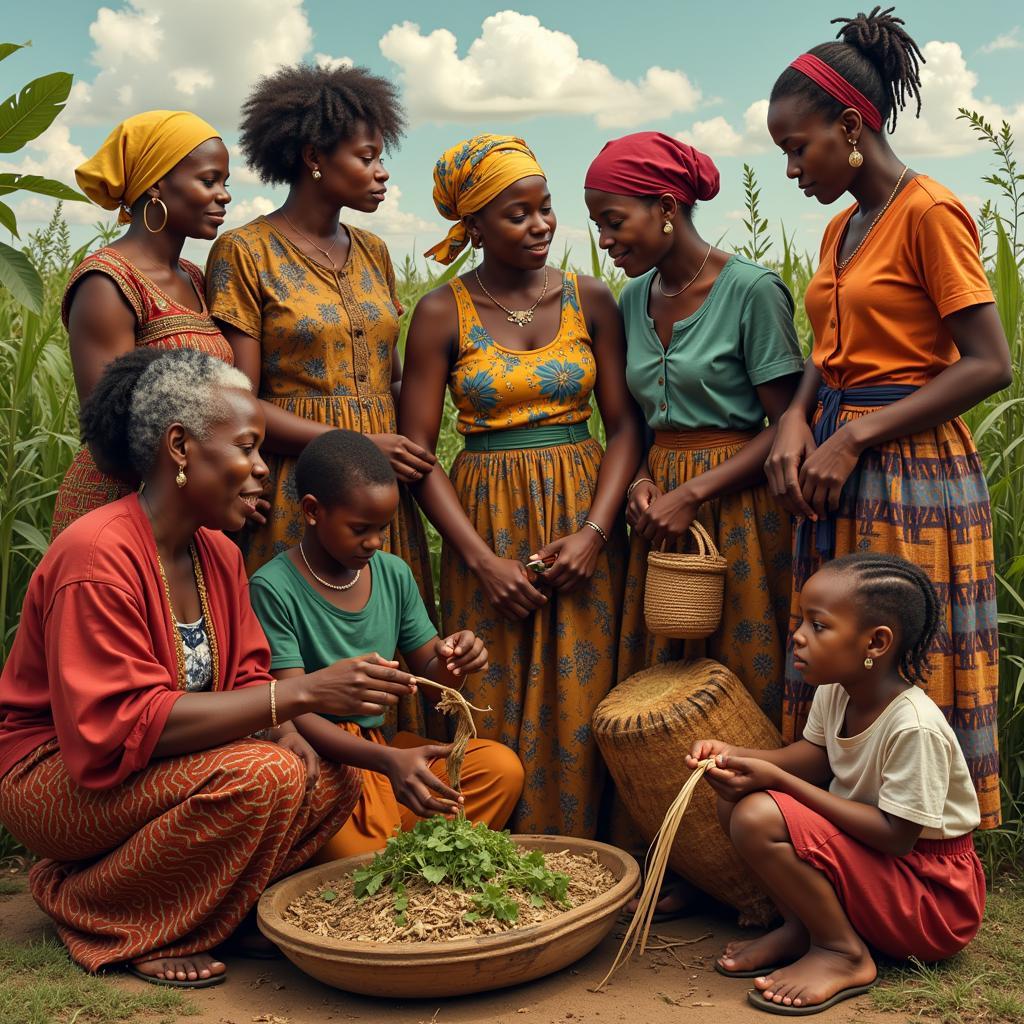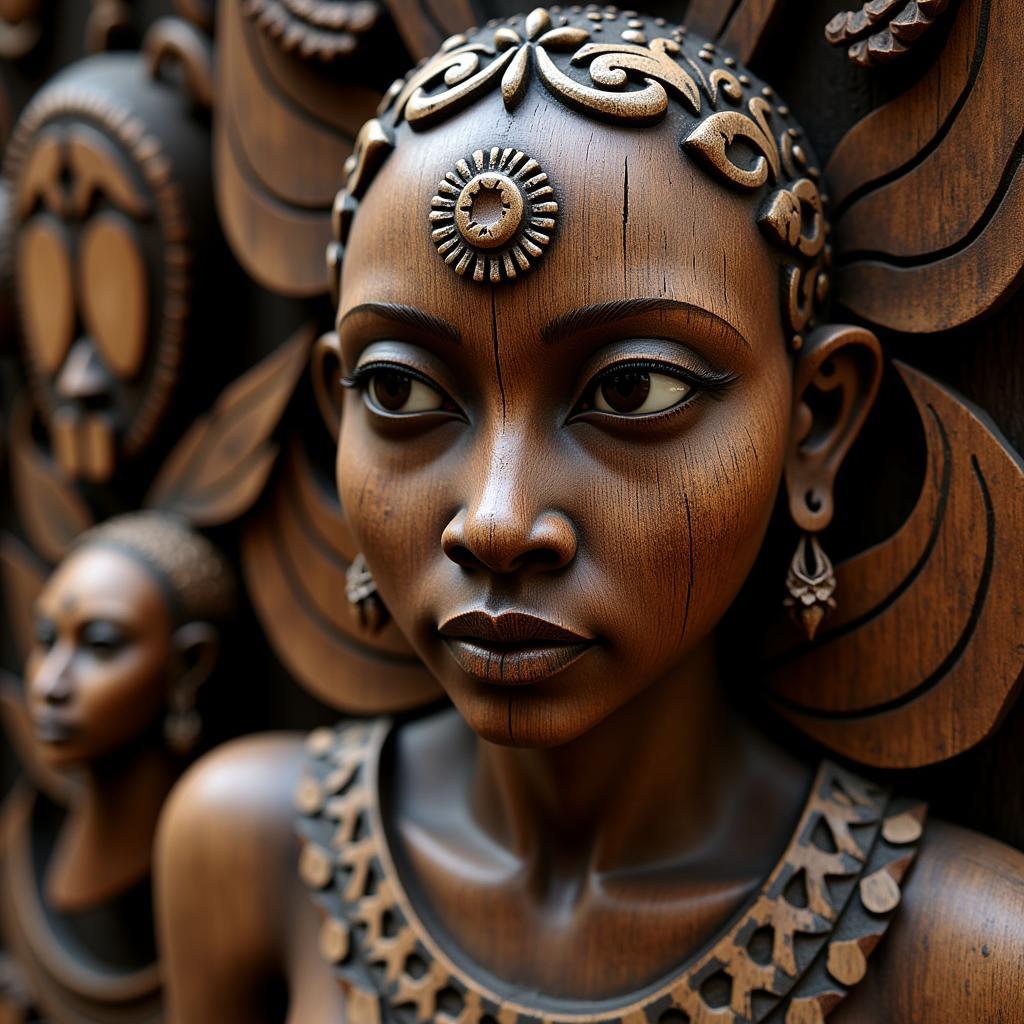Exploring the Rich Tapestry of African Family Culture
African Family Culture is a vibrant and diverse tapestry, woven with threads of tradition, resilience, and deep-rooted values. From the bustling cities of Nigeria to the serene landscapes of Botswana, family remains the cornerstone of African societies. This article delves into the heart of African family culture, exploring its unique characteristics, challenges, and enduring significance in a rapidly changing world.
The Essence of Ubuntu: Community and Kinship
At the heart of African family culture lies the philosophy of Ubuntu, a Nguni Bantu term that encapsulates the interconnectedness of humanity. It emphasizes the importance of community, compassion, and shared responsibility. This translates into strong family ties, where extended families often live together or in close proximity, providing a vital support system for all members. Grandparents, aunts, uncles, and cousins play active roles in raising children, sharing wisdom, and reinforcing cultural values. This communal approach fosters a sense of belonging and mutual respect. For example, in many West African cultures, children are taught to address elders with specific titles of respect, reflecting the high regard for seniority and experience.
What are the core values of African family culture? African family culture prioritizes respect for elders, communal living, shared responsibility, and the transmission of cultural heritage.
Respect for Elders and Ancestral Wisdom
Respect for elders is a cornerstone of African family culture. Elders are revered as repositories of wisdom and experience, their guidance sought on important decisions. Ancestral reverence is also prominent, with many families maintaining strong connections to their ancestors through rituals and storytelling. african family tree provides an excellent visual representation of these intergenerational connections.
The Role of Women in African Families
Women play a vital role in African family culture, often serving as the backbone of the household. They are responsible for nurturing children, managing the home, and contributing to the family’s economic well-being. However, their contributions often go unrecognized, and many women face challenges related to gender inequality and limited access to resources.  African Women Supporting Each Other
African Women Supporting Each Other
Navigating Modern Challenges: African Family Culture in Transition
How is African family culture adapting to modern challenges? African families are navigating globalization, urbanization, and economic pressures while striving to maintain their cultural values and traditions.
The Impact of Globalization and Urbanization
Globalization and urbanization have brought significant changes to African family structures. The migration of young people to urban centers in search of economic opportunities has led to smaller family units and a shift away from traditional communal living. This presents challenges in maintaining close family ties and transmitting cultural values across generations.
Economic Pressures and Family Dynamics
Economic pressures are also impacting African families. Many families struggle to meet basic needs, putting a strain on relationships and increasing the burden on women. Despite these challenges, the spirit of resilience and the importance of family remain strong.
Celebrating Diversity: A Kaleidoscope of Traditions
African family culture is not monolithic. african cartoon mom son comics offers a lighthearted look at the dynamics within contemporary African families. The continent is a mosaic of diverse ethnic groups, each with its own unique customs and traditions. From marriage ceremonies to naming rituals, these diverse practices reflect the richness and complexity of African heritage. african american christmas greetings provides insight into how African Americans, who share a deep connection with their African heritage, celebrate this important holiday.
Marriage and Family Structures
Marriage customs vary widely across Africa. Polygamy, while practiced in some communities, is not the norm. Many cultures emphasize the importance of extended family involvement in marriage arrangements.
Child Rearing and Education
Child rearing practices in Africa emphasize community involvement and the transmission of cultural values. Children are taught to respect elders, value education, and contribute to the community.
Conclusion
African family culture is a powerful force that shapes individuals, communities, and nations. It is a source of strength, resilience, and cultural identity. While facing modern challenges, African families continue to uphold their core values, ensuring the continuity of their rich traditions for generations to come. Understanding African family culture is crucial to appreciating the diverse tapestry of human experience.
FAQ
- What is the concept of Ubuntu?
- How does globalization impact African family culture?
- What are some common marriage customs in Africa?
- What is the role of elders in African families?
- How are children raised in African families?
- What are some of the challenges faced by African families today?
- How can we learn more about specific African cultures and their family traditions?
For further insights into this topic, you might find african family sex and african buety wife fucking relevant, although these topics require sensitive and mature handling.
Here are some other questions you might find helpful:
- How do African families maintain their traditions in a rapidly changing world?
- What are the different family structures found across the African continent?
- How can we support African families in overcoming the challenges they face?
When you need support, please contact us. Phone: +255768904061, Email: kaka.mag@gmail.com or visit us at Mbarali DC Mawindi, Kangaga, Tanzania. We have a 24/7 customer service team.

